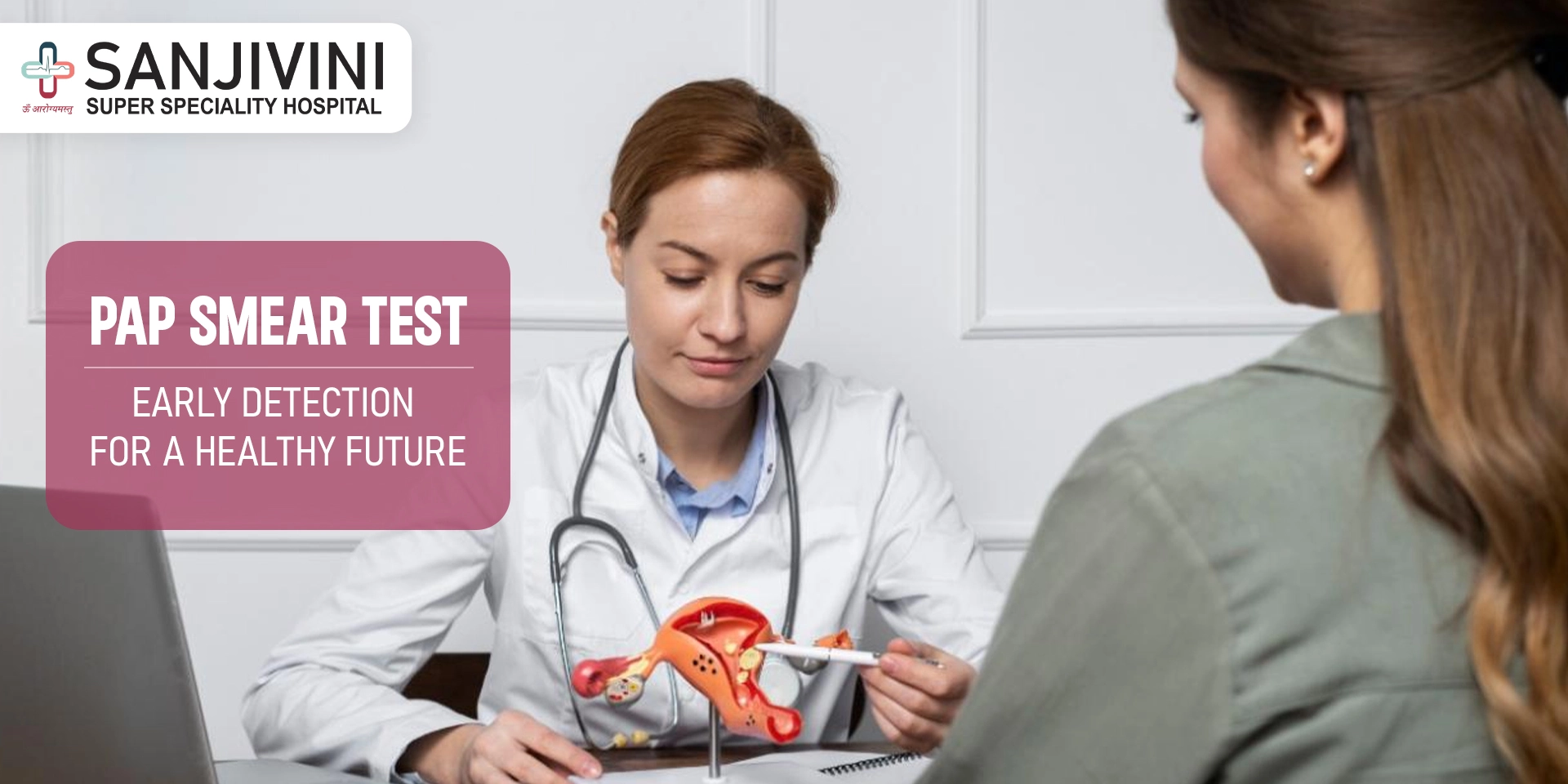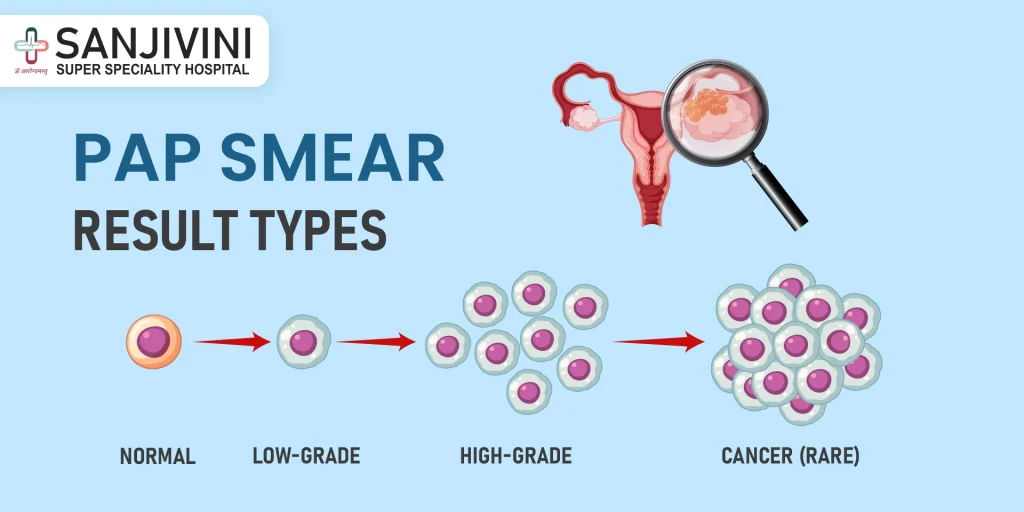
Medically Verified by – Dr Humaira Siddiqui M.B.B.S, M.S (Obs & Gyne)
Pap smear test is a simple, but an effective tool for cervical cancer screening and prevention. Preventive measures against cervical cancer are achieved through early detection of abnormal changes in the cells of the cervix. When you act early, you can put yourself in control of your own long-term well-being.
What Is a Pap Smear Test?
A Pap smear (or Pap test) is a screening procedure that is used in cervical health. In a pelvic exam, a doctor or nurse gently obtains cells at the surface of the cervix — the opening of the uterus. These cells are then tested in the lab to detect changes that can lead to cancer.
The process is fast, and it normally takes a short duration, and is normally well-tolerated. It usually helps detect any cell changes before they can become cancerous.
Why Early Detection Matters
Cervical cancer in many cases develops slowly. Such a slow development process will provide a window of opportunity where screening will be effective. Regular cervical cancer screening helps identify abnormal changes long before symptoms appear in women.
Cervical cancer is fourth most commonly diagnosed cancer problem among women on a worldwide basis. Most of the deaths are in the low and middle-income countries, where screening and treatment access is very much limited. The importance of Pap smear testing is that it is able to detect pre-cancer changes, prior to them transforming into cancer. In case the abnormal cells are detected before they progress to cancer, the results will be much better.
Who Should Get a Pap Smear and How Often?
A Pap smear is a key part of every women’s health checkup, especially for those women who are between 21 and 65. Depending on your medical background and country, guidelines may differ, but most of the physicians adhere to these general guidelines:
- The screening process should start at age of 21 (or as advised by your gynaecologist).
- Among women who are between 21 and 29 years, a Pap smear test procedure should be done every three years.
- In women between 30 and 65 years old, the treatment to use is usually:
- Pap smear test every 3 years, or
- High-risk HPV test every 5 years, or
- Co-testing (Pap + HPV) every 5 years.
Once the patient has passed 65 years of age, in case the patient has been under routine tests with consistently positive outcomes, a clinician may recommend terminating further tests. Abnormal results in the past, poor immune system (such as HIV), and other risk factors may lead your doctor to recommend you to undergo more regular tests.
The above-mentioned intervals help balance risk and benefit: frequent screening might cause the patients to have anxiety and undergo unnecessary treatments while the rare one could be missing very early changes.
How to Prepare for the Pap Test
In order to achieve the most precise Pap smear results, the following procedure should be followed:
- No intercourse, vaginal creams or lubricants use, no douching in the last 24 hours before the test.
- Try to schedule the test when you are not on your period, unless your doctor says otherwise.
- Inform your doctor about pregnancy, infections, and the use of specific medications in the past period of time.
- Wear comfortable clothes and arrive with any of your previous test records or medical history.
With proper preparation, the sample will be clean and the results would be reliable.
Understanding Your Results

Your Pap smear test result will come back as one of several categories. Here’s a simplified explanation:
- Normal: No abnormal cells found.
- Abnormal -low grade: Mild alterations in cervical cells, usually observed.
- Abnormal -high grade: More significant changes; the follow-up can be HPV test, colposcopy (detailed cervical exam) or treatment of the precancerous lesions.
- Cancer detected: Rare when screening is regular; immediate treatment and follow-up required. Uncommon when screening is done regularly; treatment must be done immediately and follow-up done continuously.
An abnormal result does not necessarily mean cancer — many cell changes resolve on their own, especially at an early stage. The most crucial thing that you can do is listening to your doctor and not missing any planned follow-up tests.
Pap Smear, HPV and Prevention
Almost all cervical cancers (>99%) are just caused by persistent infection with certain high-risk types of human papillomavirus (HPV). The continuous Pap smear screening is an important factor in the early detection of cervical cancer and, hence, prevention by administering the necessary treatment on time.
Here’s how prevention fits together:
- HPV vaccination for women and girls who will be vaccinated before the contact with this virus are statistically likely to have about ten million times less instances of cervical cancer.
- Regular Pap smears or HPV testing can detect cell changes at an early stage of cancer.
- A proper sex life and frequently conducted health check-ups will reduce risk and provide prompt outcomes.
According to the World Health Organization (WHO), to eliminate this cervical cancer as a public-health problem, all countries should try to aim for a “90-70-90” target by the year 2030:
- 90% of girls should be fully vaccinated by the age of 15.
- 70% of women should be screened with a high-performance test by the age of 35 and again by the age of 45.
- 90% of women with precancer were treated, and also 90% of women with invasive cancer were managed.
With the combination of screening and vaccination and proper treatment, cervical cancer can be prevented to a great extent. You can also read more about cervical cancer prevention on the CDC’s official page.
Why the Hospital’s Role Matters

By choosing a reputable hospital like Sanjivini Super Speciality Hospital to screen yourself and provide the follow up services, you will obtain some unique benefits:
- Our expert team ensures complete gynaecology checkup and follow-up for comprehensive care.
- Effective record keeping and tracking of abnormal results.
- Internal referral pathways for further care if needed like: colposcopy, biopsy, treatment.
- Preventive health educational resources and support.
Sanjivini Super Speciality Hospital is one of the leading centers for cervical cancer screening and Pap smear test in Lucknow, offering comprehensive care under expert gynaecologists. A fast 10 minutes Pap smear has the capability to keep you healthy for many more years.
Take the Next Step
- In case a period exceeding three years (or five years, according to your age and the type of test) has passed, do a screening.
- The Pap smear should be included in your women’s health check-up list so that you can avoid difficulties at early stages and have no problems.
- Ask your doctor about HPV vaccination in case you are within the required age, or you have a daughter who may be eligible.
- Use our preventive-health services to bundle your screening with other health examinations (blood pressure, diabetes, etc.).
- In case an abnormal result is received, then take immediate action by calling the gynaecology department so that a further examination can be conducted.
- Talk to your friends and family — screening is not just for you, it’s for everyone you care about.
Frequently Asked Questions
Does a Pap smear test hurt?
No. Most patients have minimal levels of discomfort or pressure on a Pap smear.
How long until I get results?
Results typically come in 1-2 weeks. Our hospital will advise you on follow-up.
What if the result is abnormal?
Abnormal does not mean cancer. It means that it might need closer monitoring or timely treatment, which is beneficial in terms of prevention.
Can I skip the Pap smear if I feel fine?
No. A change in the cervix may take place without any symptoms and screening detects them before they cause complications.
What if I’m pregnant?
Often you can have a Pap smear test during your pregnancy. Discuss with your obstetrician.
Final Word
Understanding the importance of Pap smear tests will empower every women to take charge of their healthier future. Sanjivini Super Speciality Hospital offers the best and trusted Pap smear testing in Lucknow with compassionate care and expert follow-up too.
Book your screening now and stay proactive about your health.
